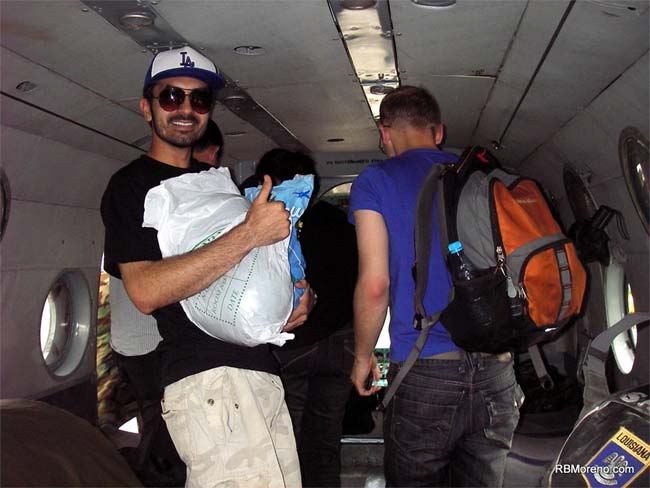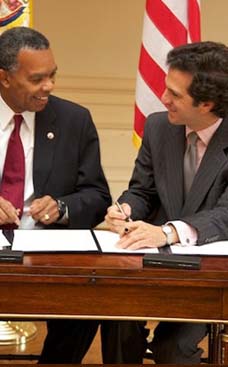
Presently, a dark sedan cruised by, pulled a U-turn, and came back for another look. Inside were three masked men and a Kalashnikov. This is what the trigger man wanted to know: Were there Uzbeks behind our tinted glass? "If any of you are Uzbeks we will kill you all," he cried. No, no, just Americans, said the man with the hatchet. Show me, said the trigger man. And so my door was yanked open, and the trigger man raised his gun. For a moment we locked eyes his glittering, angry, undecided. "No Uzbeks!" I repeated in Kyrgyz, my voice catching. Then the sedan's engine roared, and they were gone. Minutes later we boarded a bus and began to roll slowly, behind a tank, through neighborhoods whose destruction we had only glimpsed earlier. Some passengers gasped at the shells of nightclubs, warehouses, and other landmarks now reduced to ashes. But other foreign nationals sitting alongside us from Denmark and France, among other places looked ecstatic. As if by magic, we were quitting what had become, overnight, a godforsaken place. It wasn't over yet. At the entrance to the airfield, another face-off, this time with scores of men agitating for weapons and furious about our convoy. Shouted questions filled the air. Who's aboard the bus? Are they taking pictures? Rocks and sticks began to pelt our windows. "Just smile at them," said one woman. Instead, we cowered on the floor. And then the unthinkable happened: guns snatched from nervous troops huddled aboard the tank. This is it, I thought to myself. What will a bullet feel like? "I love you," said another woman next to me, to her friend. Both began to cry. A long volley rang out. But we could feel no pain. By some miracle these were warning shots, aimed at the clouds. Again an engine roared. And we were through.
Peace Corps Volunteer Raul Moreno writes: As two helicopters lifted us skyward and circled Sulayman Mountain, a barren rock ringed by a cemetery that juts skyward from the middle of Osh, the scene became apocalyptic
Tuesday, June 15, 2010
Exit Osh (Updated)
Caption: June 15, 2010: Peace Corps Volunteers reach the safety of a helicopter in Osh. All of the Peace Corps volunteers in the southern region have been evacuated safely. Most of the violence has been restricted to the south, and the north remains peaceful. It is anticipated that volunteers will remain in the north. Photo: R Moreno
By R.B. Moreno
I came to Central Asia to teach English, live among local people, and tell their stories. So this life in a compound near Bishkek that offers Gatorade and cable TV feels a bit unnerving. For the second time in as many months, I find myself behind barbed wire, along with other U.S. Peace Corps volunteers evacuated from provinces rocked by what newspapers have called ethnic cleansing. Our exit from Osh, Kyrgyzstan's jewel of the South, says something about what is happening there.
Over two days, ten aid workers gathered in safe houses on both sides of the conflict. When our food ran low, neighbors smuggled us bread and tea and refused to be compensated. But others sent rocks through our windows and demanded bribes. And all the while, bands of young, ethnic Kyrgyz, enraged by rumors of students having been raped, terrorized the streets around us. They ransacked Uzbek apartments. They torched markets and restaurants. They burned vehicles, piled them into barricades, and shot at those trying to escape the city. By night, gunfire and screaming mixed with thunderclaps.
At last two hired cars arrived to get us to an airfield. The drivers wore bandanas; one carried a hatchet, another a hunting rifle. But there was confusion about where to rendezvous with another convoy. And so for 20 long minutes we sat exposed on burning Lenin Street. Smoke and sirens hung in the air. Rioters sped past carrying metal pipes, even a bow and arrow. Most of our cell phones didn't work. Every time I shifted my legs, the volunteer pinned beneath me became asphyxiated. Another suggested running headlong toward a city park.
Presently, a dark sedan cruised by, pulled a U-turn, and came back for another look. Inside were three masked men and a Kalashnikov. This is what the trigger man wanted to know: Were there Uzbeks behind our tinted glass? "If any of you are Uzbeks we will kill you all," he cried. No, no, just Americans, said the man with the hatchet. Show me, said the trigger man. And so my door was yanked open, and the trigger man raised his gun. For a moment we locked eyes his glittering, angry, undecided. "No Uzbeks!" I repeated in Kyrgyz, my voice catching. Then the sedan's engine roared, and they were gone.
Minutes later we boarded a bus and began to roll slowly, behind a tank, through neighborhoods whose destruction we had only glimpsed earlier. Some passengers gasped at the shells of nightclubs, warehouses, and other landmarks now reduced to ashes. But other foreign nationals sitting alongside us from Denmark and France, among other places looked ecstatic. As if by magic, we were quitting what had become, overnight, a godforsaken place.
It wasn't over yet. At the entrance to the airfield, another face-off, this time with scores of men agitating for weapons and furious about our convoy. Shouted questions filled the air. Who's aboard the bus? Are they taking pictures? Rocks and sticks began to pelt our windows.
"Just smile at them," said one woman. Instead, we cowered on the floor. And then the unthinkable happened: guns snatched from nervous troops huddled aboard the tank.
This is it, I thought to myself. What will a bullet feel like?
"I love you," said another woman next to me, to her friend. Both began to cry.
A long volley rang out. But we could feel no pain. By some miracle these were warning shots, aimed at the clouds. Again an engine roared. And we were through.
As two helicopters lifted us skyward and circled Sulayman Mountain, a barren rock ringed by a cemetery that juts skyward from the middle of Osh, the scene became apocalyptic. Towers of black smoke marked Uzbek neighborhoods engulfed in flames. Much of the Cheremushki district appeared to have vanished. Some buildings glowed orange; others collapsed as we passed over head. Pushing north, with the sun setting, Osh became a terrible blur on the horizon.
It's been three days since our evacuation, and for some, a creeping sense of guilt has begun to build. It comes in the form of a question no counselor can satisfactorily answer: By what twist of fate did we deserve to escape such carnage, while others perished? Two of the drivers who ferried us between safe houses, I'm told, were shot or beaten to death. Some 100,000 refugees have streamed west to safety in Uzbekistan, only to have the border shut and some of their children trampled in a stampede.
Calls to friends in Osh tell of still more suffering: empty food stalls at the bazaar; snipers picking off Uzbeks from atop Sulayman Mountain; a mother seven months pregnant dying of thirst on a rooftop; a Pakistani student, mistaken for an Uzbek, shot and beaten to death in the street. Although the official death toll stands at 138, locals tell of hundreds already buried and more bodies yet to recover.
"I wish I could have pushed some magic button that would have saved everyone," one volunteer told me yesterday. "I can take no pride in having been evacuated."
Postscript (July 1, 2010) -- After being removed temporarily at the request of the U.S. Peace Corps, this post has been republished. Excerpts are also available at NPR's blog.












